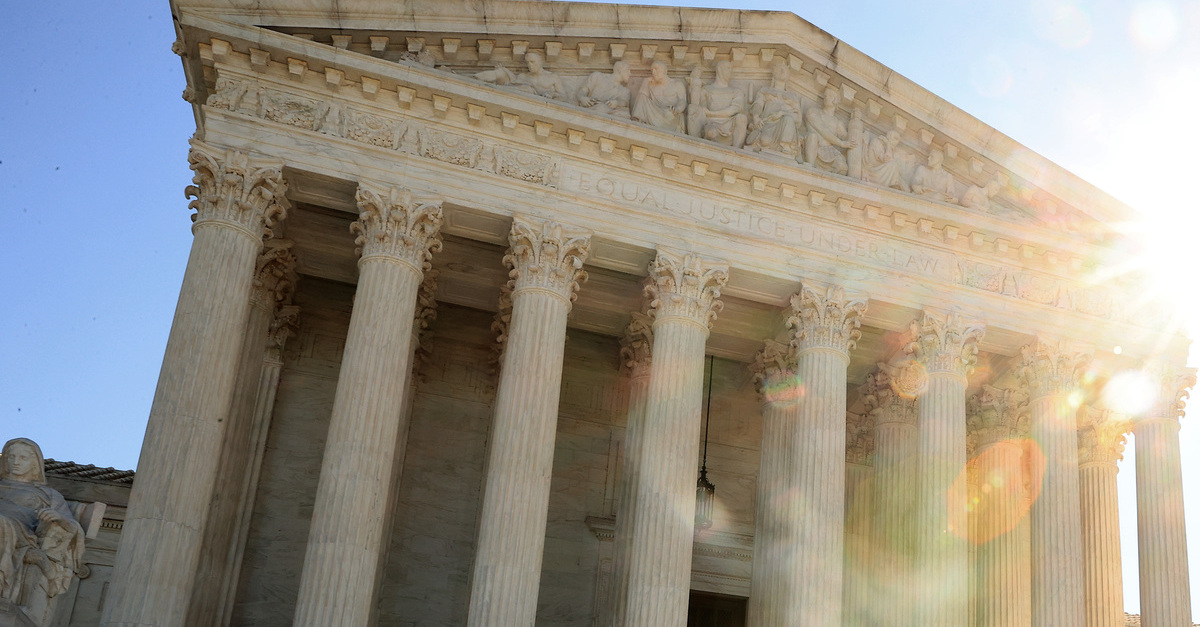
The sun shines on the Supreme Court building in Washington D.C.
The Supreme Court agreed on Thursday to hear a North Carolina gerrymandering case that could hand state legislatures the sole power on how to conduct elections, a proposition that led one voting rights scholar to warn it is “extremely dangerous.”
The case, Moore v. Harper, challenges a decision by the North Carolina Supreme Court invalidating the maps of the state’s GOP-dominated General Assembly for partisan gerrymandering. Legislators, led by Rep. Tim Moore (R), argued that their branch of government has the power of conducting “Times, Places and Manner of holding elections” under the U.S. Constitution, a notion commonly known as the independent state legislature theory. The challengers’ case posits that this power trumps that of the courts to decide that their actions violate state constitutions or results in unfair maps.
That was a theory openly pushed by pro-Trump attorneys like John Eastman in seeking to overturn President Joe Biden’s victories in key states like Arizona, Wisconsin, Michigan, Georgia, and Pennsylvania. Indeed, Eastman’s six-page plan to overturn Donald Trump’s defeat, sometimes described as the “coup memo,” started with that proposition.
“Article II, § 1, cl. 2 of the U.S. Constitution assigns to the legislatures of the states the plenary power to determine the manner for choosing presidential electors,” the memo began.
James A. Gardner, a professor and election law scholar at the University at Buffalo School of Law, told Law&Crime that proponents of the independent state legislature theory go even further than that—vesting state legislatures with the “exclusive” power.
“It is thus an unchecked institution,” Gardner noted.
Moore, the speaker of the North Carolina House of Representatives and lead plaintiff in the case the Supreme Court agreed to hear, amplified Trump’s false election fraud claims. On Nov. 12, Moore tweeted out photographs of his trip to Pennsylvania for the so-called “ballot count oversight and elections integrity effort,” posing next to signs reading “STOP THE STEAL” and “Fraud Squad Welcome!”
In 2020, at least four justices on the Supreme Court’s right flank appeared to embrace the independent state legislature theory: Clarence Thomas, Samuel Alito, Neil Gorsuch and Brett Kavanaugh, in a pair of statements on the emergency docket.
READ RELATED: SCOTUS Rules Biden Admin Can End ‘Remain in Mexico’ Policy
Election law expert Rick Hasen, a professor at the University of California at Irvine, wrote in a blog post that the case “could provide a path to election subversion.”
“This extreme position would essentially neuter the development of any laws protecting voters more broadly than the federal constitution based on voting rights provisions in state constitutions,” Hasen said.
Joshua Douglas, an election law professor at University of Kentucky, told Law&Crime that Moore v. Harper is an “extremely dangerous case in that it could take away state constitutional limits on state legislatures when they enact restrictive voting rules.”
“Already, U.S. Supreme Court interpretation of the right to vote is unduly narrow,” Douglas wrote in an email. “Advocates have rightly gone to state courts, seeking to use the broader protection of voting in state constitutions to protect voters. This doctrine would gut that state-level protection by saying that state legislatures are essentially free actors when enacting election rules for federal elections.”
Gardner, the University at Buffalo School of Law professor, put it more bluntly.
“It could mean that there are now four votes in support of the independent state legislature doctrine,” Gardner told Law&Crime. “More broadly, it is an opportunity for a court that has now openly abandoned its commitment to liberal democracy to improve the odds that the Republican Party, a minoritarian, illiberal, and authoritarian party, to seize power.”
The case will be heard when the court’s term begins in October.
[Image via Chip Somedevilla/Getty Images]
Have a tip we should know? [email protected]
Source:




